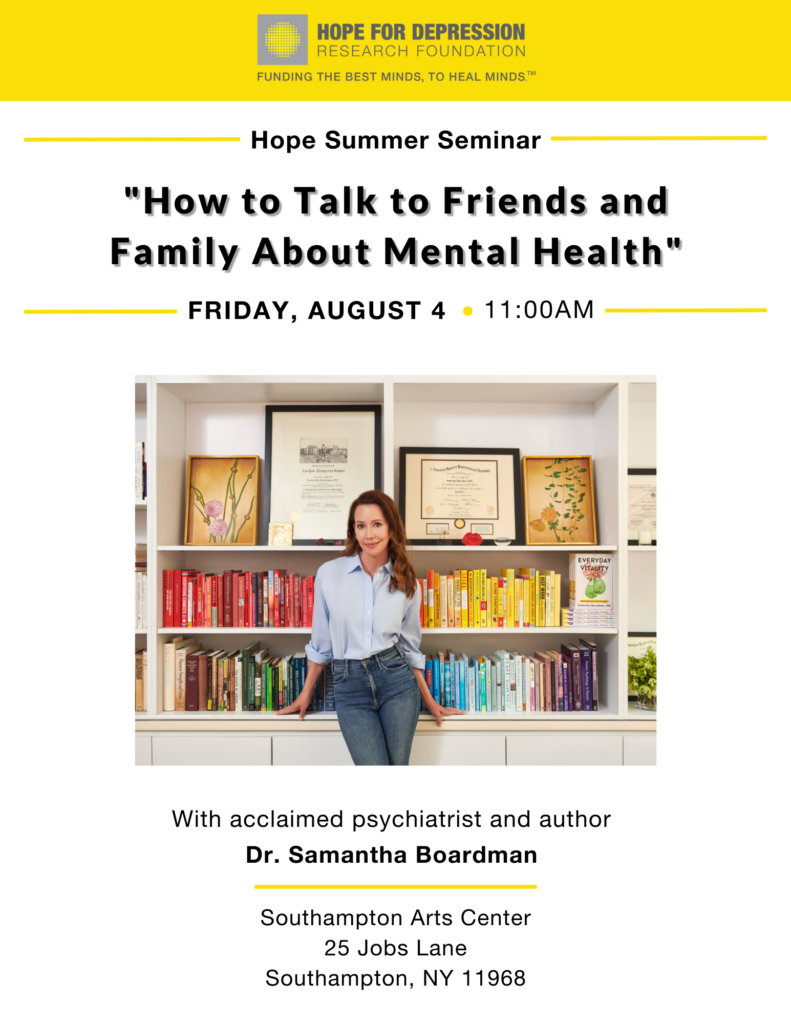Hope for Depression Research Foundation and Southampton Arts Center Host HOPE Summer Seminar: “How To Talk To Friends and Family About Mental Health”
Engaging Conversation with Acclaimed Psychiatrist Dr. Samantha Boardman & Psychologist Dr. Aliza Pressman, moderated by HDRF Founder Audrey Gruss
On Friday, August 4, 2023, Hope for Depression Research Foundation (HDRF) held its second annual Hope Summer Seminar in Southampton, with g a discussion on “How to Talk to Friends and Family About Mental Health.” Acclaimed NYC psychiatrist Dr. Samantha Boardman, daughter of Palm Beach residents D. Dixon Boardman and Pauline Pitt, was the featured speaker along with Dr. Aliza Pressman, a developmental psychologist. The seminar was expertly moderated by HDRF Founder & Chair Audrey Gruss. Held at the Southampton Arts Center, the HOPE Summer Seminar was a pivotal event in the lead-up to the eighth annual Race of Hope 5K to Defeat Depression on Sunday, August 6
More than 70 guests attended, including Southampton community members, mental health professionals, and Race of Hope committee members, many of whom are Palm Beach residents such as Frances Fisher, Candy Hamm, Thomas Quick, and Scott Snyder.
HDRF’s Executive Director Louisa Benton was the first to take the floor to introduce Founder and Chair Audrey Gruss and speak about HDRF’s important mission. Benton said: “We are the nation’s leading nonprofit dedicated to fighting depression by bringing together top scientists from around the world to study the brain and advance the understanding and treatment of depression. We have a second mission, which brings us here today and that’s to educate and raise mental health literacy and dispel the myths around depression.”
Grussthen introduced the seminar’s two speakers: Dr. Boardman, the author of the blog “Positive Prescription” and the book Everyday Vitality: Turning Stress into Strength, and Dr. Pressman, the Co-founder of the Mount Sinai Parenting Center, and Assistant Clinical Professor, Department of Pediatrics, Division of Behavioral and Developmental Health, Kravis Children’s Hospital, Icahn School of Medicine.
Gruss started the discussion by touching on the alarming rise in teen depression and how to navigate conversations with teens who may be struggling. She noted that last Fall the U.S. Surgeon General declared a national crisis in youth mental health and that more than one in three high school students had experienced sadness, hopelessness, and suicidal thinking, a 40% increase since 2009.
Dr. Boardman responded: “It’s so tempting when depression symptoms occur to talk to teens in a way that can invite them to ruminate — the experience where you are in your head asking questions and second-guessing all your actions. Parents should be aware of co-rumination, which is when we engage in rumination with another person, asking them to relive and rehash. Instead of this, we can ask our teens to take a step back from that stew of emotions, and ask them something like ‘How you would explain this to a friend of yours?’”
Dr. Pressman added: “One thing that parents can do that is counterintuitive is to say less and help them feel more. We tend to want to fix feelings, but for the majority of kids they want someone who can let them feel their feelings without making them feel responsible to assure the adult that they are okay.”
The discussion went on to cover a variety of topics such as how to speak to female friends and family members about depression, how to make it safe for men to talk about their feelings and ask for help, and the ten signs of depression. On each point, Drs. Boardman and Pressman were eloquent and informative. At the end of the discussion, Audrey Gruss opened the floor for audience Q & A.
The Q&A kicked off with a question posed by a 17-year-old young man about how to help friends get professional mental health support. Dr. Boardman spoke about demystifying therapy and medication, as well as giving insight into the most sensitive language to use when talking to a friend about mental health struggles. The session continued with Dr. Boardman speaking about the differences between depression and depressive episodes, noting that it’s far more common for people to have depressive episodes and that the adolescent brain is quite susceptible. A question about medication sparked a conversation about how the conventional treatments available today – the SSRI-type medications – do not work for 50% of patients. That is why HDRF’s mission to find new targets for treatments is so important.
Dr Boardman said: “There isn’t that simple fix. Treatment for depression is still trial and error. We don’t have precision medications or treatments yet, but I am optimistic because of the work that Hope for Depression is doing.”

